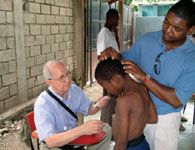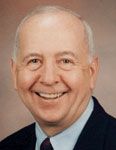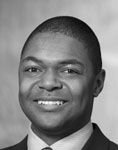- General Dermatology
- Eczema
- Chronic Hand Eczema
- Alopecia
- Aesthetics
- Vitiligo
- COVID-19
- Actinic Keratosis
- Precision Medicine and Biologics
- Rare Disease
- Wound Care
- Rosacea
- Psoriasis
- Psoriatic Arthritis
- Atopic Dermatitis
- Melasma
- NP and PA
- Skin Cancer
- Hidradenitis Suppurativa
- Drug Watch
- Pigmentary Disorders
- Acne
- Pediatric Dermatology
- Practice Management
- Prurigo Nodularis
Article
Haiti earthquake leaves devastation - and uncertainty for AAD initiative
The devastating earthquake that struck Haiti on Jan. 12 has also dealt a major setback to an American Academy of Dermatology (AAD) initiative to teach local doctors to better care for their patients' dermatologic needs, say three doctors involved with the program.

Key Points
National report - The devastating earthquake that struck Haiti on Jan. 12 has also dealt a major setback to an American Academy of Dermatology (AAD) initiative to teach local doctors to better care for their patients' dermatologic needs, say three doctors involved with the program.
Alix J. Charles, M.D., and James Ertle, M.D., of Illinois, and James J. Nordlund, M.D., of Mason, Ohio, had originally planned to travel to Haiti in late January in connection with the project.

Veterans of many trips

In January, they were to have stayed at the very hotel that has made headlines because of its devastation - Hotel Montana, in Port-au-Prince. But their plans - to teach fourth-year medical students at the university - changed because of the strike.

The dermatologists had planned to travel to Léogane, which is near the epicenter of the quake. They previously had established a continuing training program on dermatological care and had located a pharmacist from Canada - Diane Lamarre, president of the Canadian Chapter of Pharmacists Without Borders - who was willing to set up a pharmacy in Haiti.
She was teaching Haitian nurses how to compound simple generic pharmaceuticals for dermatology, according to Dr. Ertle.
Strong ties to Haiti
Dr. Charles, whose parents emigrated to the United States from Haiti in the 1960s, was born in Chicago, but continues to have strong ties to Haiti.
His aunt, Denise Joachim, is a nun in a convent in Jeremie, which was not as badly affected by the disaster as was the capital city. The family reports she is alive and well.
In addition to making a few trips a year to Haiti with the AAD, Dr. Charles also travels there on other volunteer medical missions.
"The work we are doing with the academy has been some of the most rewarding work," he says. "We are trying to promote a lot of education and, therefore, a long-lasting legacy, in terms of dermatologic knowledge for the healthcare practitioners in Haiti."
Uncertainty at first
Dr. Charles and Dr. Ertle, who both have practices in Hinsdale, Ill., did not yet know at press time what had been undone by the quake.
"Certainly what I have heard ... is that there are hospitals in Port-au-Prince that have been destroyed. I am not sure how the medical school is doing," Dr. Charles says.
"We are hoping to go back and continue our educational mission, but it is difficult to say because we do not know what is left standing."
He says the three doctors were planning to return in April, and may still make the trip, but perhaps to another part of Haiti.
AAD hopes to assist
The AAD's plans are on hold, too.
President David M. Pariser, M.D., says the academy is hoping to provide "focused assistance" to the hospital in which the AAD worked to help establish a pharmacy.
"We are waiting to make a decision on the most appropriate assistance, and there will be a call to action for members in the near future," Dr. Pariser says. He says information will be posted to the academy's Web site after the decision is made.
Dermatologists wishing to help in the immediate aftermath of the quake might best assist by donating to the American Red Cross and to other credible relief organizations, the doctors say.
"I think in the future, there is going to be more need for medical professionals and others to go to Haiti to administer care, to see patients, to educate," Dr. Charles says.





